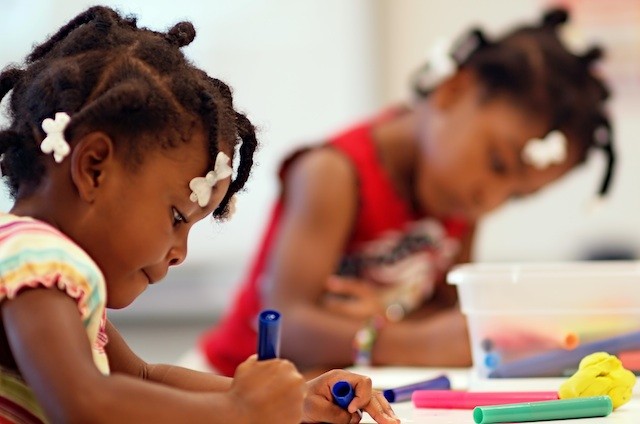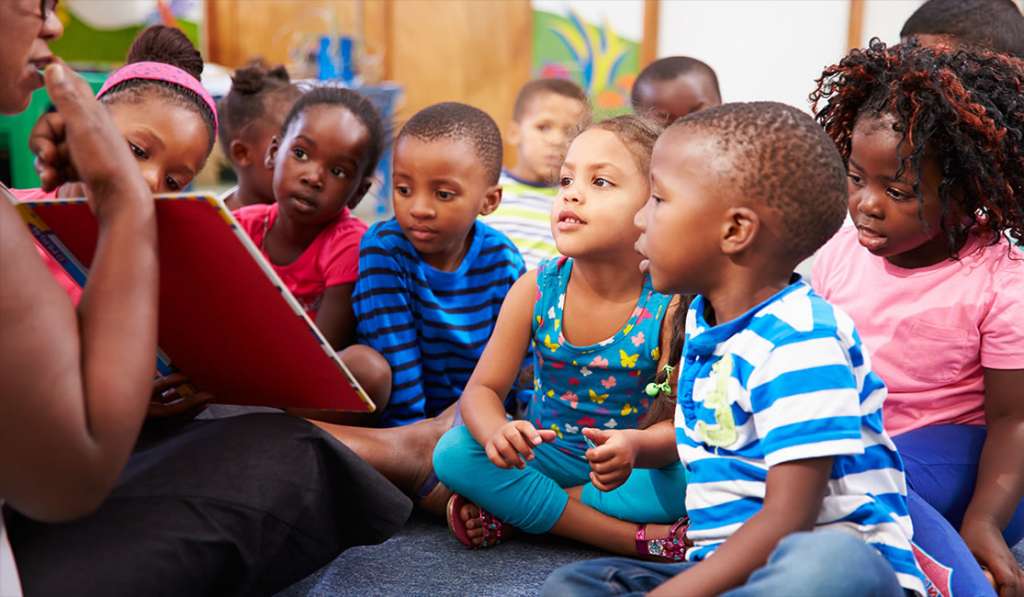South Jamaica Center For Children and Parents, Incorporation
N.I.A., Mission Statement:
“To Attack Illiteracy and Poverty And Promote Social/Economic
Change, Service to Children and Parents.”
South Jamaica Center has been a quality program for a long time. Since 1970, as sponsors of a Delegate Agency via the grantee, the Agency for Child Development (ACD) which is now called Administration for Children Services (ACS) we have proven our ability to administer early childhood programs. The key leaders in our organization have always been dedicated and determined. The Administrative Director at our inception possessed a Bachelor’s degree in Social Work and a strong desire to see children in poverty neighborhoods get a head start on their education; she hired staff with the same determination and created a comprehensive child development program.
The agency has two centers, and they are listed for identification purposes, by roman numerals I & II. Center I is presently funded for 60 children and is the program that was established in 1965 as a community action agency, utilizing Head Start Guidelines for its operation. The program was sponsored by Queens College (CUNY), and was funded for 120 children/families. In 1970, South Jamaica Center for Children and Parents, Inc., was organized and took over the sponsorship. In 1983, the agency applied for and received funding for an extra 120 children. Since renovations for the site was taking place we conducted Home Base service for the children until the site was completed at which time we continued to serve families, center based, double session, 3 1/2 hours and variation of center attendance from 7:30am to 6:00pm. In 1988 Center II moved to the Campus of York College with funding or 136 children and their families. Presently Center II is funded for 60 children and families.
In 1997, we were one of the top 10 Head Start Programs in New York State and in 1999 one of the top ten programs in New York University Center for Academic and Workforce Development for our support and efforts in creating employment opportunities for York College City University of New York students.
From September 2000 to June 2005 thirty-six of Center I children were served under Universal Pre-Kindergarten. From September 2008 through January 2012 eighty-nine children were served under ACS Universal Pre-Kindergarten with seventy-two at Center II. As of February 2012, we are serving an additional 30 children at Center I. From October 2012 we are a EarlyLearn Head Start program and we started serving the children full day. We are serving sixty children under ACS Universal Pre-Kindergarten.


Contact Us
Our agency has been a part of the CACFP program for over thirty-five years. It goal, as is ours, is to improve the health and nutrition of children and adults in the program while promoting the development of good eating habits and the furtherance of nutrition education. We work closely with a certified nutritionist to ensure that menus developed by the nutrition staff and the meals they prepare are in constant compliance with all CACFP requirements. The nutritionist will provide training and staff development when necessary.
We have since extended to include a Special Education Integrated Class (2000). Inclusion is the preferred method of placement for children with special needs whenever possible. Children with disabilities in our integrated class at Center II are educated in regular education settings with typically developing peers to the maximum extent appropriate in light of their needs. Children need to be active, not passive learners. Our teachers work alongside the Special Education Teachers provides “integrated co-teaching services” to ensure the children with disabilities are free to learn at their own pace. Children need to experience success, learning goals need to be specific, attainable, and measurable and have some challenge for them. The home base services we provide are to help parents improve their parenting skills, enhance their knowledge and understanding of the developmental progress of children in the program and assist them in the use of the home as the child’s primary learning environment. The teacher who visits the home will work with the parents to help them provide learning opportunities that enhance their child’s growth and development. Group socialization activities emphasize peer group interaction through age appropriate activities in a Head Start classroom and are designed so that parents will observe at times and actively participate at other times.
Outcomes
South Jamaica Center’s Child Outcome Plan will be revised to ensure that the curriculum will enhance and support each child’s development in the five essential domains of school readiness and that the ongoing child assessment completed three times a year, helps to plan optimal learning opportunities for all children, including dual language learners and children with disabilities, as well as align to the school readiness goals and track children’s progress across developmental domains.
Family and Community
As evidence of program quality, we are proud of the many accomplishments over years of service to children, families and community:
Men’s Group Committee: (established since 1965)
Group of men with children enrolled in the Head Start Program as well as men involved in South Jamaica and the surrounding communities that wish to support our children in changing their community. To help shape the future, assist in building a strong foundation, and give social and emotional support. Men, who have an impact on the life of a child and want to be involved in their child’s education, are asked to join in supporting the children of our community.
ESL (English as a Second Language)
Started in 2009, was a collaboration program conducted at York College. The program was designed to teach non-English speaking parents or other members of the community English, thus allowing them to communicate better and therefore be more independent.
P.E.V.S.T. (Parent Education Volunteer Substitute Training)
The purpose of this training was to assist parents in the development of skills and attitudes to work successfully with children in the classroom and at home. To increase parents understanding of activities and experiences provided in the classroom. Develop and enhance parents’ feeling of self worth and confidence. Provide experience which can be used for career development and provide parents with experiences in writing a resume.
This certificate program will help to ensure continuous coverage in classrooms and kitchens at each center. The parent volunteer or substitute will be activated in the event of short term absence of center staff, thereby, maintaining the required level of operations at each component.
A.L.E.R.T.A. (A Learning Experience Responsive To All)
Since 1986, as part of our diversity curriculum and currently in support of our Dual Language Learners we have celebrated ALERTA, where children and parents come together with other families to share their heritage through discussions, artifacts, food and music. Families are encouraged to wear traditional clothing, if possible. Understanding and respecting the cultures and home languages of their peers as well as others in the community and incorporating them into the curriculum supports the child’s social and emotional development and demonstrates respect for the values and beliefs of others.
Transition
Since 1983 we have had an Education Follow-Through Advisory Board in place which meets once a year with principals. Collaborations for the smooth transitions of our children are formed and letters of commitment are obtained. Kindergarten registration and disabilities programs are discussed. We also host an Education Forum in the beginning of the year for families transitioning to public school, where parents can learn about their zoned school by talking with teachers, counselor, principals, parent coordinators, and other school representatives. Parents will receive relevant information regarding kindergarten, charter and private school’s registration procedures, as well as specialized programs for gifted/talented or special needs children.
Once a year we host a workshop for parents called Advocacy for Children. This is an informational workshop to help the transition for both special needs and typically developing children. Parents learn about exercising their rights as parents in the public-school system and are encouraged to continue their involvement in their child’s education.
ASSESSMENT
Our agency uses the self-assessment process annually as a method of measuring the agencies accomplishments, to identify strengths and weaknesses in all components of the program. This assessment allows for annual updating or revision of the program plans and improvement of service delivery methods. This will allow for program quality enhancement as well as timely responses to issue that may arise in the program, the community and among enrolled families. This provides an opportunity to include parents, community stakeholders, and staff as part of the self-assessment team and become aware of how the program is viewed. The management team collects data, makes an assessment of staff and program goals and needs, designed a staff development and trainings plan with strategies to improve the areas of weakness. Implement the plan and monitor to ensure that the necessary steps are being taken to meet Federal regulations.
ECERS-R (Early Childhood Environment Rating Scale)
South Jamaica Center has used the ECERS assessment tool since 2010.
A widely used program quality assessment instrument designed for preschool, kindergarten and child care classrooms. It was used to for supervision, program improvement and by teaching staff as a form of self-assessment. We also used it for teacher training purposes.
CLASS (Classroom Assessment Scoring System)
CLASS uses research-driven insights to improve how teachers interact with children every day to cultivate supportive, structured, and engaging classroom experiences. CLASS is a flexible tool that focuses on the heart of great teaching: the teacher-student interactions proven to drive learning and development. CLASS helps child-care providers nurture children’s early learning while responding to their needs. As children enter preschool, their sense of themselves is grounded in, and dependent on, relationships. CLASS helps preschool teachers foster a secure, supportive base for learning and exploration.
